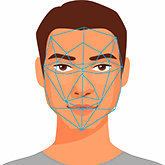Intel RealSense ID, i.e. face recognition in ATMs and locks paired with smart home systems
Source: Pure PC added 07th Jan 2021Biometrics is the future of security. We can see it on the example of consumer electronics such as smartphones, tablets and laptops. The mentioned categories of devices, however, are only the first stage of a real popularization of this technology. Intel, thanks to the proprietary RealSense ID, intends to implement facial recognition based on artificial intelligence to equipment such as ATMs and smart-locks used in our homes and apartments. A praiseworthy idea, however, are biometric security features sufficiently resistant to attempts to cheat technology by more or less primitive methods? Intel says yes, which gives us some certainty.
Intel intends to use RealSense ID user facial recognition technology in smart home systems and ATMs.
Metadata and data – a treasury of knowledge about us and our habits
The Intel RealSense ID depth sensor will be used in ATMs, for which it will be used to authorize transactions (e.g. cash withdrawals). It seems that the solution will also be used in electronic, intelligent locks on the doors of houses and apartments. This will primarily ensure convenience and no need to carry items such as physical keys and cards. Sure, we can use smartphones, but it will not be as fast as recognizing a human image. If you are concerned about the low performance and meager level of security RealSense ID offers, we have good news.
New test procedure for gaming laptops with Intel Tiger Lake-H, AMD Cezanne-H and NVIDIA GeForce RTX 3000
The technology combined with the neural network scans the contours of the face, each time correcting its operation and adapting to changes in the appearance of the user. This means that facial hair, glasses and other factors will not affect the effectiveness of a system that does its job in less than a second. The tool is to be resistant to attempts to cheat with masks, photos and videos. Nor should we worry about privacy. The data will be stored locally and, importantly, will be fully encrypted. The question remains, how quickly and whether the method will be accepted by banks at all?
Source: Engadget, Intel
